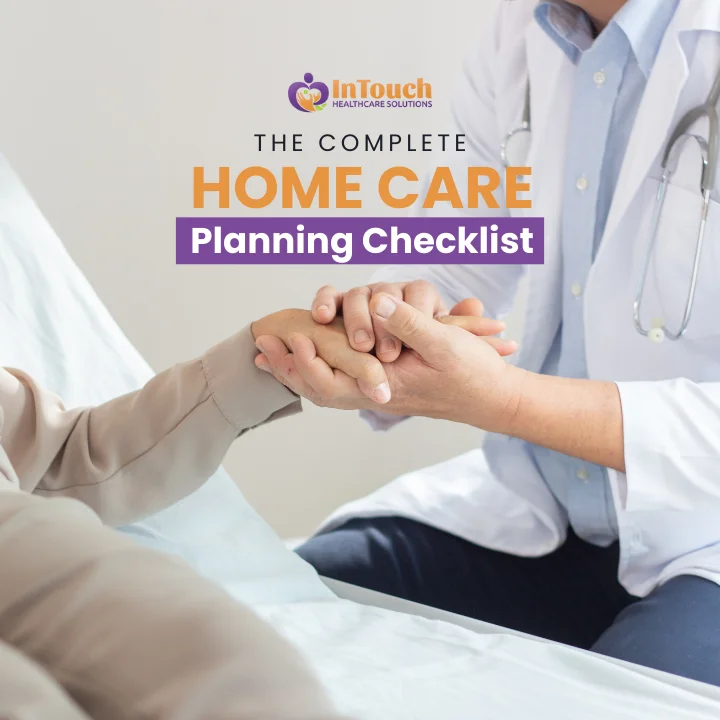
Key Takeaways

- Skilled nursing care involves medical services provided by licensed nurses, often prescribed after a hospital stay or surgery.
- It can include medication management, injections, wound care, and at-home rehabilitation therapies.
- Skilled care can be provided at home when arranged through a qualified agency and ordered by a physician.
- Agencies such as InTouch Healthcare Solutions provide expert care services that enhance the patient’s well-being while ensuring peace of mind for their families.
When your loved one is discharged from the hospital, the next steps can feel uncertain. You’re told they need “skilled nursing care” — but what does that really mean? And more importantly, does it always require a facility or nursing home stay?
Skilled nursing care refers to medical services provided by licensed nurses under a doctor’s direction. According to Medicare.gov, Skilled nursing care is a vital medical service provided by licensed nursing professionals or under their supervision. It is not only beneficial but also regulated and essential for recovery and illness management.
Skilled nursing encompasses a range of services, including wound care, medication management, occupational therapy, and physical therapy. It serves as a crucial link between hospital care and home life. For families collaborating with a trusted home healthcare provider such as InTouch Healthcare Solutions, skilled nursing guarantees that family members receive secure, consistent, and compassionate care within the familiarity of their own residences.
Whether your family member has just had surgery, is managing medical conditions like COPD, or is experiencing difficulties with mobility and medication management, this guide will explain what skilled nursing care involves, how it functions in a home setting, and when it may be necessary to seek it out.
What Is Skilled Nursing Care — and What Makes It “Skilled”?
Not all caregiving is created equal. When your loved one needs more than just help with meals or housekeeping, skilled nursing steps in. So, what is skilled nursing care exactly?
Expert nursing care consists of medical services delivered by certified professionals, typically a registered nurse (RN) or a licensed practical nurse (LPN), under the oversight of a physician. A doctor prescribes these services to treat an injury, illness, or chronic condition.
Here’s the difference: if a caregiver helps with dressing and companionship, that’s considered non-medical care. If a nurse manages wound dressings, tracks vital signs, administers injections, or performs medication management, that’s skilled nursing care.
And importantly, it doesn’t always mean moving to a facility. Thanks to Medicare-covered home healthcare, many families can now get skilled nursing at home. This helps the person recover in a familiar place. It means less disruption, fewer hospital visits, and better emotional well-being.
A report from Medicare.gov outlines how home-based skilled nursing care is not only allowed under certain conditions, but also preferred for patients who are homebound or recovering from surgery, illness, or hospitalization.
This type of care often includes:
- Monitoring of unstable health status
- Teaching new health management techniques (like insulin injection or catheter use)
- Assistance with complex wound care or surgical dressings
- Observation and assessment during recovery
- Supporting recovery from stroke, heart failure, or injury
Who Provides Skilled Nursing Care and Where Can You Receive It?
Skilled nursing care is delivered by licensed healthcare professionals — and that distinction matters. These are not aides or companions. They include RNs, LPNs, and sometimes NPs working under a doctor. Each has specific training to handle clinical needs, manage medications, monitor conditions, and assist in recovery from medical events.
What surprises many families is that skilled nursing care doesn’t only happen inside hospitals or nursing homes. It can also be provided:
- In a skilled nursing facility (SNF): A short-term stay following a hospital discharge, often used for rehab after surgery or illness.
- In rehabilitation centers: For more intensive therapy and monitoring after acute events.
- In long-term care settings: For individuals with serious chronic conditions requiring round-the-clock care.
- At home: Through home healthcare agencies like InTouch Healthcare Solutions, skilled care can be brought directly to your door.
Choosing the right setting depends on the person’s condition, mobility, and personal needs. Many older adults like skilled nursing at home. It lowers stress, keeps routines the same, and helps avoid extra stays in facilities.
Families often ask: is in-home skilled nursing as effective as facility-based care?
The answer is: in many cases, yes. This is true when a person is stable enough to stay home but needs medical supervision. Skilled nursing services at home offer safety and comfort. They provide personalized care and coordinate with doctors. Patients also have access to physical or occupational therapy. This allows them to receive care in a familiar environment.
Signs Your Loved One May Need Skilled Nursing Care
Determining the need for skilled nursing can be unclear, even with home support. But when health needs go beyond what a caregiver or home aide can provide, it’s time to consider skilled nursing care.
Here are some clear signs that skilled clinical support may be needed:
- Worsening of chronic conditions such as diabetes, heart disease, or COPD that require ongoing monitoring and treatment adjustments.
- Frequent medication changes or complex prescriptions that need professional medication management to avoid errors.
- Recent hospital discharge after surgery, stroke, or serious illness, with instructions for follow-up wound care, injections, or therapy.
- Decline in mobility or strength, making it difficult to perform daily tasks safely without professional oversight.
- Signs of infection, confusion, or poor healing, which can signal underlying complications needing nursing attention.
- Unmanaged pain or symptoms that require assessment and coordination with a doctor.
Families often delay care because they aren’t sure if these issues are “serious enough.” The sooner you involve a skilled nurse, the better the results. This is especially true for recovery, independence, and safety.
Skilled nursing can often be provided at home, minimizing travel stress and maintaining a stable environment. Nurses play a vital role in monitoring health, coordinating care, and managing medications.
Expert Nursing Care Provided by a Home Health Care Agency
Choosing a home healthcare agency for skilled nursing care brings licensed medical support right to the person in need. This means no stress from hospital visits or stays in facilities. But what does that actually look like in practice?
When a family works with a trusted agency like InTouch Healthcare Solutions, the process is clear and organized. It is based on quality. Here’s what to expect:
- Qualified Staff: The agency assigns experienced registered nurses (RNs) or licensed practical nurses (LPNs), based on the level of care needed. All care is supervised and coordinated with the client’s physician.
- Flexible Scheduling: Visits are tailored to the patient’s condition and daily routine, accommodating both short-term recovery and long-term chronic care.
- Collaboration with Therapists and Caregivers: Skilled nurses collaborate with physical and occupational therapists and non-medical caregivers in a team. This integrated approach ensures continuity and full-circle support.
- Regulatory Standards and Oversight: Reputable home healthcare agencies are licensed and follow state and federal healthcare standards. Families benefit from knowing the care is compliant, ethical, and reviewed for quality.
- Ongoing Communication: The agency keeps families informed. Nurses document every visit, track progress, and keep physicians updated. This transparency helps everyone stay on the same page and respond quickly if needs change.
For many families, working with an agency offers more than just clinical care. It provides structure and support. When skilled nursing services are part of a coordinated home plan, recovery is easier, safer, and less stressful.
Conclusion
Skilled nursing care brings hospital-level help right to your home. It supports recovery, manages chronic conditions, and helps you stay independent. Having a skilled nurse at home can help you in many ways. They can assist with wound care, manage your medications, and provide rehabilitation support. This gives you peace of mind and leads to better outcomes.
If you are unsure if this care is right for your loved one, talk to professionals. They understand both medical needs and daily care.
Contact InTouch Healthcare Solutions today to learn how our skilled nursing services can support your family with reliable care, expert oversight, and peace of mind — right at home.
Frequently Asked Questions about Skilled Nursing Care
What is the meaning of skilled nursing care?
Skilled nursing care refers to medical services provided by licensed professionals such as registered nurses or therapists. These services include wound care, IV therapy, rehabilitation, and medication management. A doctor usually orders them based on medical needs.
What is another name for skilled nursing care?
It is often called post-acute care or short-term nursing care. This type of care is given after a hospital stay. It helps support recovery at home or in a special facility.
What is the difference between long-term care and skilled nursing?
Long-term care helps people with daily living activities for a long time, often due to aging or disability. Skilled nursing is medical care given for a short time, usually after an illness, injury, or surgery, and involves licensed health professionals.
Who qualifies for skilled nursing care at home?
Individuals recovering from surgery, managing chronic conditions, or requiring therapy—such as occupational or physical therapy—may be eligible for in-home skilled care if their doctor provides a prescription. Insurance coverage often depends on medical necessity and documentation.
How is skilled nursing care coordinated in a home healthcare agency?
A home healthcare agency works with the patient’s physician to develop a care plan. Skilled nurses follow this plan closely, monitor progress, and communicate with other healthcare providers to adjust care as needed.






